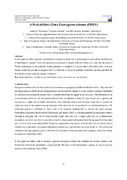| dc.contributor.author | Wanambisi, Adrin W. | |
| dc.contributor.author | Maende, cleophas | |
| dc.contributor.author | Muketha, Geoffrey Muchiri | |
| dc.contributor.author | Aywa, Shem | |
| dc.date.accessioned | 2019-05-05T08:08:36Z | |
| dc.date.available | 2019-05-05T08:08:36Z | |
| dc.date.issued | 2013-01-01 | |
| dc.identifier.issn | 22243186 | |
| dc.identifier.issn | (Online)22250921 | |
| dc.identifier.uri | https://www.iiste.org/Journals/index.php/JNSR/article/view/4187 | |
| dc.identifier.uri | http://erepository.kibu.ac.ke/handle/123456789/825 | |
| dc.description.abstract | In this paper the author presents a probabilistic encryption scheme that is polynomially secure and has the efficiency of deterministic schemes. From the theoretical construction of Brands and Gill (1996), it is clear that the proof of Pseudo randomness of the quadratic residue generator is complete if it can be shown that there exists a one-way function under the possible assumption that it is infeasible to solve the quadratic residuacity problem provided the factorization of the composite integer is unknown | en_US |
| dc.language.iso | en | en_US |
| dc.publisher | international journal sharing platiform ; Journal of Natural Sciences Research | en_US |
| dc.rights | Attribution-NonCommercial-ShareAlike 3.0 United States | * |
| dc.rights.uri | http://creativecommons.org/licenses/by-nc-sa/3.0/us/ | * |
| dc.subject | Quadratic residuacity | en_US |
| dc.subject | pseudorandom number generator | en_US |
| dc.subject | one-way function | en_US |
| dc.title | A probabilistic data encryption scheme | en_US |
| dc.type | Article | en_US |

